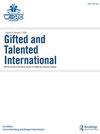Missing link between talent development and eminence: Why gifted students abandon their pursuit of science
Q3 Social Sciences
引用次数: 0
Abstract
ABSTRACT Talent development in science is a national investment as it is key to enhancing national competitiveness. However, even after undergoing a 3-year training in a science gifted academy, 8.5% of South Korea’s gifted students choose to enter medical school rather than pursuing a science or technology major. By conducting in-depth interviews with five participants, this study determines why talented students who are trained to become scientists at high schools and universities change their major to medicine. The participants were high school graduates gifted in science selected by purposive sampling according to the following criteria: Individuals entered medical school immediately after graduation, majored in a STEM at university and then entered a graduate school of medicine, and have a master’s or doctoral degree in a STEM major but changed their major to becoming a doctor. This study investigates students who have lost motivation for a pure STEM career to reflect on the educational and social driving forces that would have enabled them to continue on their path to become scientists. In addition, as it examines the current controversy over these individuals’ career choices, the study has implications for the development of talent development goals from a macro perspective.人才发展与卓越成就之间缺失的一环:为什么天才学生放弃了对科学的追求
科学人才培养是一项国家投资,是提高国家竞争力的关键。然而,即使在科学天才学院接受了3年的培训后,8.5%的韩国天才学生选择进入医学院,而不是攻读科学或技术专业。通过对五名参与者进行深入采访,这项研究确定了为什么在高中和大学接受科学家培训的天才学生会改学医学。参与者是根据以下标准通过有目的的抽样选出的具有科学天赋的高中毕业生:个人毕业后立即进入医学院,在大学主修STEM,然后进入医学研究生院,拥有STEM专业的硕士或博士学位,但转专业为博士。这项研究调查了那些对纯粹的STEM职业失去动力的学生,让他们反思教育和社会驱动力,这些驱动力本可以让他们继续走上成为科学家的道路。此外,本研究考察了当前关于这些人职业选择的争议,从宏观角度对人才发展目标的制定具有启示意义。
本文章由计算机程序翻译,如有差异,请以英文原文为准。
求助全文
约1分钟内获得全文
求助全文

 求助内容:
求助内容: 应助结果提醒方式:
应助结果提醒方式:


